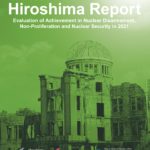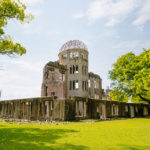5. The United States ■Nuclear-Weapon State
| Nuclear Disarmament | 14.1 Points | Full Points 101 | 14.0% |
| Change compared to the Hiroshima Report 2020: +2.2 | |||
| The U.S. is estimated to possess 5,800 nuclear warheads, the second largest NWS next to Russia, and continues to dismantle retired warheads. It explores to strengthen its nuclear deterrent, inter alia, by deploying low-yield nuclear warheads for SLBMs. The U.S. continues to implement New START. Meanwhile, it could not reach an agreement during 2020 with Russia on the extension of the deadline of the treaty. The U.S. has not signed the TPNW. In the meantime, it argues the necessity of the improvement of international security environment for the progress of nuclear disarmament, and hosts a Creating the Environment for Nuclear Disarmament (CEND) working group. It has not ratified the CTBT; and voted against the UNGA Resolution calling its earlier entry into force. The U.S. conducted a subcritical experiment in November. While the U.S. remains the one of the most transparent NWS on nuclear issues, it has reduced in transparency, and refused to publicize the number of nuclear warheads possessed and dismantled, respectively, again in 2020. It has established and led the “International Partnership for Nuclear Disarmament Verification (IPNDV).” It co-sponsored and voted in favor of the UNGA resolution on nuclear disarmament proposed by Japan. | |||
| Nuclear Non-Proliferation | 38 Points | Full Points 47 | 80.9% |
| Change compared to the Hiroshima Report 2020: -1 | |||
| After its withdrawal from the JCPOA in 2018, the U.S. bolstered sanctions on Iran, including secondary sanctions. It also insisted to snap back the UN sanctions against Iran, which was rejected by other members of the Security Council. The U.S.-North Korea summit meetings were held in February (Hanoi) and June (Panmun Branch) 2019, but little progress was achieved. It disagreed to the UNGA Resolution on the Establishment of WMD-Free Zones in the Middle East again (with Israel). The U.S. has proactively led the efforts to bolster nuclear nonproliferation, including contributions to the IAEA safeguards systems and implementation of stringent export controls. It acceded to the IAEA Additional Protocol with the provision for complementary access visits. In 2020, it did not submit a report based on the Guidelines for the Management of Plutonium to the IAEA. | |||
| Nuclear Security | 25 Points | Full Points 41 | 61.0% |
| Change compared to the Hiroshima Report 2020: +1 | |||
| The U.S. has ratified all conventions relevant to nuclear security, introduced the recommended measures of INFCIRC/225/Rev.5, including measures against insider threat and cyber threat. The U.S. has been actively involved in international efforts to minimize the use of HEU through the GTRI. | |||






